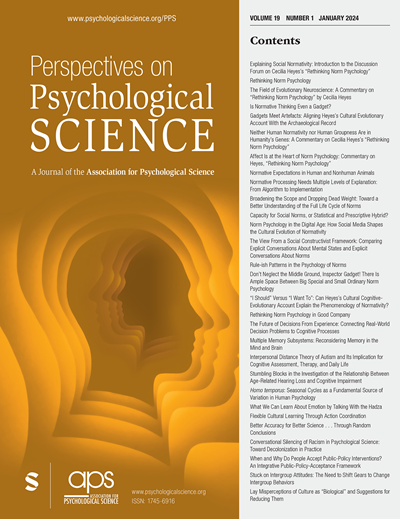The Myth of the Need for Diversity Among Subjects in Theory-Testing Research: Comments on “Racial Inequality in Psychological Research” by Roberts et al. (2020)
IF 8.4
1区 心理学
Q1 PSYCHOLOGY, MULTIDISCIPLINARY
引用次数: 0
Abstract
Roberts and colleagues focus on two aspects of racial inequality in psychological research, namely an alleged underrepresentation of racial minorities and the effects attributed to this state of affairs. My comment focuses only on one aspect, namely the assumed consequences of the lack of diversity in subject populations. Representativeness of samples is essential in survey research or applied research that examines whether a particular intervention will work for a particular population. Representativeness or diversity is not necessary in theory-testing research, where we attempt to establish laws of causality. Because theories typically apply to all of humanity, all members of humanity (even American undergraduates) are suitable for assessing the validity of theoretical hypotheses. Admittedly, the assumption that a theory applies to all of humanity is also a hypothesis that can be tested. However, to test it, we need theoretical hypotheses about specific moderating variables. Supporting a theory with a racially diverse sample does not make conclusions more valid than support from a nondiverse sample. In fact, cause-effect conclusions based on a diverse sample might not be valid for any member of that sample.理论测试研究中需要受试者多样性的神话:对罗伯茨等人撰写的《心理学研究中的种族不平等》(2020 年)的评论
罗伯茨及其同事重点讨论了心理学研究中种族不平等的两个方面,即所谓的少数种族代表性不足和这种状况造成的影响。我的评论只集中在一个方面,即研究对象缺乏多样性的假定后果。在调查研究或应用研究中,样本的代表性是至关重要的,因为这些研究是要考察某项干预措施对特定人群是否有效。而在试图建立因果关系规律的理论测试研究中,代表性或多样性则不是必需的。因为理论通常适用于全人类,所以全人类(甚至是美国大学生)都适合用来评估理论假设的有效性。诚然,理论适用于全人类的假设也是一个可以检验的假设。然而,要检验它,我们需要关于具体调节变量的理论假设。用不同种族的样本来支持一个理论,并不会使结论比非不同种族的样本更有效。事实上,基于多元化样本得出的因果关系结论可能对该样本中的任何成员都无效。
本文章由计算机程序翻译,如有差异,请以英文原文为准。
求助全文
约1分钟内获得全文
求助全文
来源期刊

Perspectives on Psychological Science
PSYCHOLOGY, MULTIDISCIPLINARY-
CiteScore
22.70
自引率
4.00%
发文量
111
期刊介绍:
Perspectives on Psychological Science is a journal that publishes a diverse range of articles and reports in the field of psychology. The journal includes broad integrative reviews, overviews of research programs, meta-analyses, theoretical statements, book reviews, and articles on various topics such as the philosophy of science and opinion pieces about major issues in the field. It also features autobiographical reflections of senior members of the field, occasional humorous essays and sketches, and even has a section for invited and submitted articles.
The impact of the journal can be seen through the reverberation of a 2009 article on correlative analyses commonly used in neuroimaging studies, which still influences the field. Additionally, a recent special issue of Perspectives, featuring prominent researchers discussing the "Next Big Questions in Psychology," is shaping the future trajectory of the discipline.
Perspectives on Psychological Science provides metrics that showcase the performance of the journal. However, the Association for Psychological Science, of which the journal is a signatory of DORA, recommends against using journal-based metrics for assessing individual scientist contributions, such as for hiring, promotion, or funding decisions. Therefore, the metrics provided by Perspectives on Psychological Science should only be used by those interested in evaluating the journal itself.
 求助内容:
求助内容: 应助结果提醒方式:
应助结果提醒方式:


